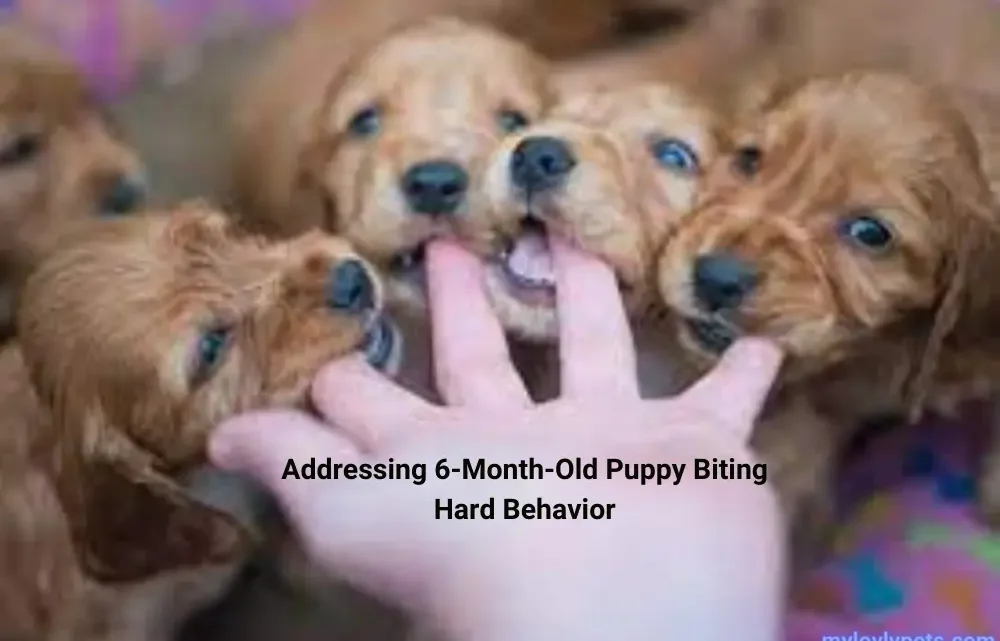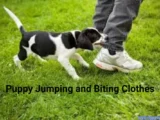
Addressing 6-Month-Old Puppy Biting Hard Behavior
Are you struggling with your 6-month-old puppy biting hard? You’re not alone. Puppy biting behavior can be frustrating, but it’s essential to address it early on. In this article, we’ll explore why puppies bite, the importance of managing this behavior from a young age, and most importantly, we’ll provide practical solutions to help you train your puppy to reduce biting. Whether your puppy is playfully nipping at your hands or showing signs of more aggressive biting, we’ve got you covered with tips and tricks to make life with your furry friend more enjoyable.
Why Do 6 Month Old Puppies Bite Hard?
Puppies, including your 6-month-old, naturally use their mouths to explore the world around them. It’s how they learn about things and play with each other. So, when your puppy bites, it’s often just their way of interacting and having fun.
At this age, biting is pretty normal. Just like human babies put things in their mouths to learn about them, puppies do the same. It’s part of their development process. So, if your puppy is biting, especially during playtime, it’s usually nothing to worry too much about.
However, it’s essential to know the difference between normal play biting and behavior that could become a problem. Normal play biting is gentle and often accompanied by wagging tails and playful behavior. But if your puppy bites too hard or shows signs of aggression, like growling or snapping, that’s when it can become a concern.
So, while biting is a natural part of your puppy’s development, it’s essential to keep an eye on their behavior and make sure it stays within the realm of playful exploration rather than becoming something more problematic.
Signs It’s Time to Act
Is your 6-month-old puppy biting hard and frequently? It’s essential to recognize when their biting behavior crosses the line from playful to problematic. Here are some signs to watch out for:
Excessive Biting: If your puppy is constantly biting, especially with increased force, it may indicate a need for intervention. While it’s normal for puppies to explore with their mouths, persistent and intense biting can become a problem.
Setting Boundaries: Teaching your puppy limits is crucial. If they don’t respond to gentle corrections or continue to bite despite your efforts to discourage the behavior, it’s time to take action. Consistency is key in establishing boundaries.
Overstimulation: Puppies can get overexcited during playtime, leading to heightened biting behavior. If your puppy becomes too wound up and ignores commands or exhibits aggressive biting, they may need a timeout to calm down.
- Persistence Despite Training: Some puppies may continue to exhibit biting behavior despite consistent training efforts. In such cases, reassess your training methods and consider consulting a professional trainer or behaviorist for personalized guidance.
- Attention-Seeking Behavior: Biting may sometimes be a manifestation of your puppy’s desire for attention or interaction. Ensure that your puppy receives sufficient mental and physical stimulation throughout the day to prevent boredom-related biting.
- Reactivity to Stress or Anxiety: Puppies may resort to biting as a coping mechanism in response to stress or anxiety. Identify potential triggers, such as loud noises or unfamiliar environments, and implement strategies to help your puppy feel more comfortable and secure.
| My Puppy Keeps Biting Me Aggressively: Tips for Pet Owners |
Managing Teething Discomfort in Puppies
When your puppy is about six months old, they’re likely going through a phase called teething. This means their baby teeth are falling out, and their adult teeth are coming in. Just like when human babies teeth, it can be uncomfortable for puppies. They might feel the need to chew on things to relieve the discomfort, and that’s when you might notice them biting more.
Here are some simple ways to help manage your puppy’s teething discomfort:
1. Provide Chew Toys: Give your puppy plenty of appropriate chew toys to gnaw on. Toys designed specifically for teething puppies, like rubber toys or dental chews, can help soothe their gums. Encourage them to chew on these toys instead of your hands or furniture.
2. Cold Treats: Cold can help numb your puppy’s sore gums. Try giving them frozen treats like carrot sticks or ice cubes wrapped in a cloth. Just make sure the treats are safe for your puppy to eat and supervise them while they enjoy them.
3. Gentle Massages: Sometimes, a gentle massage of your puppy’s gums can provide relief. You can use your finger or a soft, damp cloth to massage their gums. Be careful not to apply too much pressure, though, and stop if your puppy seems uncomfortable.
4. Avoid Hard Objects: While it’s important to provide chew toys, avoid giving your puppy hard objects like bones or antlers, especially while they’re teething. These items can be too tough on their developing teeth and may cause damage.
5. Redirect Biting: If your puppy starts biting on something they shouldn’t, gently redirect them to a chew toy instead. Use positive reinforcement when they chew on the toy, praising them for making the right choice.
Play Biting vs. Aggression
When to Seek Professional Help
Beyond Puppy Biting: Adolescence and Continued Mouthy Behavior
Final Words When 6 Month Old Puppy Biting Hard
In wrapping up, it’s important to remember a few key things when dealing with a 6-month-old puppy biting hard.
Firstly, understanding why puppies bite is crucial. It’s a natural behavior for them, often stemming from play and exploration. However, it’s essential to recognize when the biting becomes excessive or problematic.
The good news is, with patience and consistent training, biting behavior can be corrected. Techniques like bite inhibition, redirection, and socialization can help teach your puppy to be gentler and less prone to biting.
If you find yourself struggling, don’t hesitate to seek help. Whether it’s consulting with a veterinarian or a professional trainer, getting assistance can make a big difference in managing your puppy’s behavior effectively.
Above all, maintain a positive relationship with your pet throughout the process. Remember, puppies are still learning, and your guidance and support are key to their development. With time and effort, you and your puppy can overcome biting behavior and enjoy a strong bond together.


